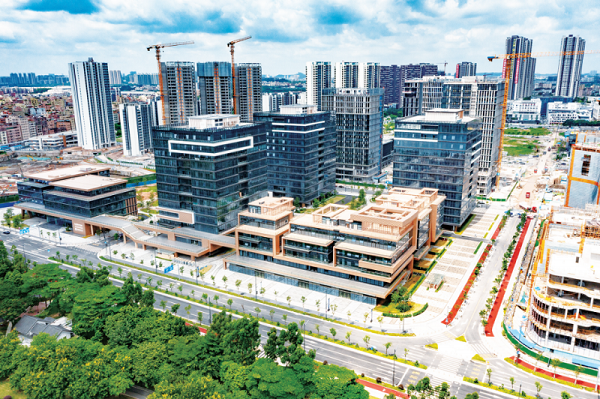Baiyun Lake Digital Technology City

Baiyun Lake Digital Technology City. [Photo/WeChat account: gz_baiyunfabu]
Guangzhou's Baiyun district recently held a conference on its digital technology industry, again drawing the world's attention to the Baiyun Lake Digital Technology City.
Adjacent to the Pearl River west channel and nestled by Baiyun Lake, the ecologically endowed Baiyun Lake Digital Technology City is witnessing the rapid aggregation of the digital economic industry. Advantages in transportation, education, healthcare, and other resources are continuously highlighted.
Significance of Development
As a central development platform for Baiyun's "one park, two cities, three districts, four capitals" initiative, the 28-square-kilometer Baiyun Lake Digital Technology City is positioned as a highland for the "Digital China" initiative, a collaborative innovation experimental zone for the Guangdong-Hong Kong-Macao Greater Bay Area, and an innovation demonstration zone for the digital economy in the Guangzhou-Foshan metropolitan area.
Since the development plan began in December 2018, the district has spared no effort in promoting the construction of Baiyun Lake Digital Technology City. By implementing development strategies that enhance industries, the environment, and urban quality, the industrial park is concentrating on key projects to promote integrated development.
Accelerated Aggregation of Digital Economic Industries
Baiyun Lake Digital Technology City, through targeted investment attraction in industries such as the metaverse, cloud computing, artificial intelligence, industrial internet, smart cities, and green energy, has attracted projects from major players such as Baidu Intelligent Cloud, Tsinghua Leaguer, and Peking University Science Park.
Within the park, 26 projects by various enterprises have been incorporated, with a planned total investment of 61.84 billion yuan ($8.66 billion). The cumulative completed investment is 40.33 billion yuan, with 5.14 billion yuan invested from January to September this year.
Among them, two technological transformation projects completed a transformation investment of 440,000 yuan, and 24 construction projects completed a construction investment of 2.74 billion yuan.







